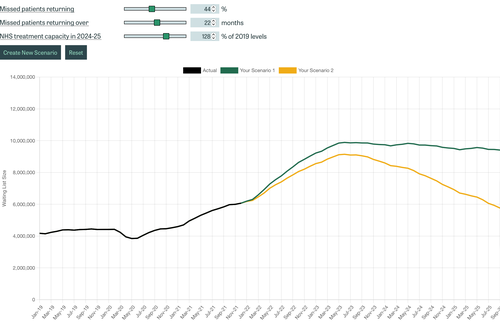Harding Prizes for useful and trustworthy communication in 2022 awarded!
Winton Centre for Risk and Evidence Communication
News - Harding Prizes for useful and trustworthy communication in 2022 awarded!

In a world where scientific information and evidence is being used daily to make cases for one viewpoint or another, it can be hard for those trying to be genuinely useful and trustworthy to win recognition. That is the rationale behind the annual Harding Prizes for Trustworthy Communication. After casting the net wide, over video platforms, social media and longer reads across the world, the judges have awarded the 2022 prizes to an interactive calculator from the Institute of Fiscal Studies and a report from the Parliamentary Office of Science & Technology.
The IFS’s interactive NHS waiting list calculator allows people to play around with ‘what if…’ scenarios to see the effect of different factors on NHS waiting lists. The judges thought that this was a ‘ground breaking’ piece of communication worthy of the Public Audience Award. “Given the importance of data in our society”, said one judge, “playing with this tool, I feel I have seen the future in democratising the models which increasingly shape our lives.”
What was particularly important was that it shows “how mathematical models which affect real life decision making are subject to change when the assumptions and parameters behind them change, and so the uncertainties and the challenges of using data to reach conclusions.”
The Parliamentary Office of Science & Technology’s ’Green Steel’ briefing for MPs, on how steel production in the UK, responsible for about 2% of the UK’s total greenhouse gas emissions, can be decarbonised, won the Expert Audience Award. The judges commented that this was “an excellent example of a complex technical subject explained with superb clarity. Its tone of detached, thoughtful authority was consistently accessible and jargon free. The document offered very detailed references; the limitations of the evidence were included and at no point did the document attempt to steer the reader to a particular viewpoint.”
They added that “The risk of overwhelming the reader was deftly avoided by a clear layout and strong sign posting. The Overview Box and two other boxes outlining background information, were models of accurate efficiency.”
The shortlisting panel found that in 2022 it was rare for people to try to be balanced in their treatment of pros and cons, and upfront about limitations and uncertainties. However, those who did, tended to do it brilliantly and highlight the need for strong sources of information in all areas of public life, from medical abortion in America to car batteries from Australia. Other communications shortlisted for the 2022 award were:
Winners were chosen by a panel consisting of Helen Boaden, Helen Jamison, Fraser Nelson and Professor Onora O’Neill, who noted that often communicators only produce information when they want to persuade people to believe or do something – especially if it benefits the communicator. In contrast, these resources have been designed for the benefit of the audience instead – to help them make up their own mind on a topic.
This kind of balanced, trustworthy communication is so rare that the award organisers want to draw attention to, and congratulate, all those that were shortlisted.
David Spiegelhalter, Chair of the Winton Centre for Risk & Evidence Communication who award the prize said: “We are bombarded by messaging that purports to be informing us, but is actually trying to manipulate our emotions and persuade us to think or act in a certain way - say by inducing anxiety, prematurely reassuring, or only telling one side of the story. This prize celebrates those who genuinely try and tell it how it is, to help us all understand more and make better decisions. All the shortlisted entries deserve our sincere congratulations."
Tracey Brown, Director of Sense about Science, one of the sponsors of the Prize said:
“The best challenge to misinformation is good information that’s open and meaningful. The Harding Prize nomination list shows what good looks like, and it includes breaking downs opaque statistics on social media, explainers of poorly understood medical treatments and web tools to explore complex relationships. Good science communication equips people to ask penetrating questions.”